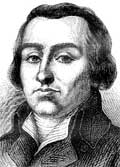 |
Pierre-Joseph Cambon
b. 10 Jun 1756, Montpellier, Hérault
d. 15 Feb 1820, Saint-Josse-ten-Noode, near Brussels, Netherlands (now Belgium) |
| Title: |
Président de la Convention nationale (President of the National Convention) |
| Term: |
19 Sep 1793 - 3 Oct 1793 |
| Chronology: |
19 Sep 1793,
elected, session of the National Convention, salle des Machines, Palais national des Tuileries, Paris [1][2] |
|
20 Sep 1793,
assumed the chair, session of the National Convention, salle des Machines, Palais national des Tuileries, Paris [1] |
|
3 Oct 1793,
ceased to exercise the functions of office upon the election of a successor [3] |
| Names/titles: |
Président de l'Assemblée nationale (President of the National Assembly) (16 Sep 1792 - 21 Sep 1792) [see details] |
| Biography: |
| Descended from a family of cloth merchants; after the father's retirement (1785), managed the family firm at Montpellier, Hérault, and was a founder of the Frères Cambon et Compagnie; served as a municipal officer at Montpellier (from 1790); elected as a representative of the Third Estate of Montpellier to the États-Généraux (Estates-General); participated in the sessions of the Assemblée nationale (National Assembly) and took the Tennis Court oath (20 Jun 1789); election was voided (25 Jul 1789) due to exceeding the number of seats for Montpellier prescribed by electoral regulations; elected (3 Sep 1791) as a representative of Hérault to the National Assembly (1791-1792); was actively involved in the debates over financial matters; served as Vice President (5 Sep 1792 - 16 Sep 1792) and President (16 Sep 1792 - 21 Sep 1792) of the National Assembly; supported the moderate Girondin faction and helped secure the safety of the royal family during the insurrection of 10 Aug 1792; was elected to the Convention nationale (National Convention) (1792-1795) as a deputy for Hérault; emerged as very influential member of the committee for finance; voted for the death sentence in the trial of King Louis XVI; member of the Comité de salut public (Committee of Public Safety) (7 Apr 1793 - 10 Jul 1793); in political views, drifted to the Jacobins, but opposed Maximilien Robespierre; proposed to draw up the Grand Livre of the national debt; served as President of the National Convention (19 Sep 1793 - 3 Oct 1793); denounced Robespierre during the coup of 9 Thermidor, Year II (27 Jul 1794); escaped arrest decreed by the National Convention for his involvement in the insurrection of 1 Apr 1795, went into hiding; was proclaimed mayor of Paris (20 May 1795) at an insurgent rally in the Hôtel de Ville, never assumed the office; amnestied (26 Oct 1795) and retired to his private estates; during the Hundred Days (Cent Jours), was elected (15 May 1815) a deputy of the Chambre des représentants (Chamber of Representatives) from Hérault; banished as a regicide (1816); moved to the Kingdom of the Netherlands and lived near Brussels until his death.
|
| Biographical sources: Dictionnaire des Conventionnels, 102-108;
Dictionnaire des parlementaires français 1789-1889, 1:561-562. |
| Elections: |
| Candidate |
Votes (19 Sep 1793) |
| Pierre-Joseph Cambon |
155 |
| voters/absolute majority |
221/111 |
|
| Source of electoral results: Archives parlementaires - Série 1, 74:500;
Procès-verbal de la Convention nationale, 21:87.
|
| |
| [1] |
Archives parlementaires - Série 1, 74:500. |
| [2] |
Procès-verbal de la Convention nationale, 21:87. |
| [3] |
Archives parlementaires - Série 1, 75:717;
Procès-verbal de la Convention nationale, 23:63. |

